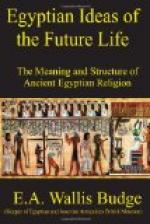The deceased, having recited these words of prayer and adoration to R[=a], the symbol of Almighty God, and to his son Osiris, next “cometh forth into the Hall of Ma[=a]ti, that he may be separated from every sin which he hath done, and may behold the faces of the gods.” [Footnote: This quotation is from the title of Chapter CXXV. of the Book of the Dead.] From the earliest times the Ma[=a]ti were the two goddesses Isis and Nephthys, and they were so called because they represented the ideas of straightness, integrity, righteousness, what is right, the truth, and such like; the word Ma[=a]t originally meant a measuring reed or stick. They were supposed either to sit in the Hall of Ma[=a]t outside the shrine of Osiris, or to stand by the side of this god in the shrine; an example of the former position will be seen in the Papyrus of Ani (Plate 31), and of the latter in the Papyrus of Hunefer (Plate 4). The original idea of the Hall of Ma[=a]t or Ma[=a]ti was that it contained forty-two gods; a fact which we may see from the following passage in the Introduction to Chapter CXXV. of the Book of the Dead. The deceased says to Osiris:—
“Homage to thee, O thou great God, thou Lord of the two Ma[=a]t goddesses! I have come to thee, O my Lord, and I have made myself to come hither that I may behold thy beauties. I know thee, and I know thy name, and I know the names of the two and forty gods who live with thee in this Hall of Ma[=a]ti, who live as watchers of sinners and who feed upon their blood on that day when the characters (or lives) of men are reckoned up (or taken into account) in the presence of the god Un-nefer. Verily, God of the Rekhti-Merti (i.e., the twin sisters of the two eyes), the Lord of the city of Ma[=a]ti is thy name. Verily I have come to thee, and I have brought Ma[=a]t unto thee, and I have destroyed wickedness.”
The deceased then goes on to enumerate the sins or offences which he has not committed; and he concludes by saying: “I am pure; I am pure; I am pure; I am pure. My purity is the purity of the great Bennu which is in the city of Suten-henen (Heracleopolis), for, behold., I am the nostrils of the God of breath, who maketh all mankind to live on the day when the Eye of R[=a] is full in Annu (Heliopolis) at the end of the second month of the season PERT. [Footnote: i.e., the last day of the sixth month of the Egyptian year, called by the Copta Mekhir.] I have seen the Eye of R[=a] when it was full in Annu; [Footnote: The allusion here seems to be to the Summer or Winter Solstice.] therefore let not evil befall me either in this land or in this Hall of Ma[=a]ti, because I, even I, know the names of the gods who are therein.”




